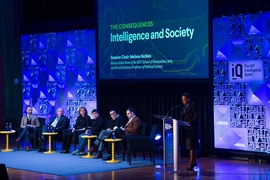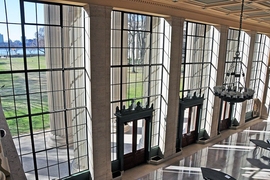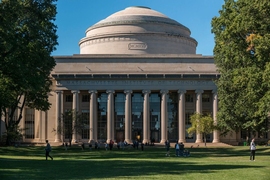Antonio Torralba has been named the inaugural director of the MIT Quest for Intelligence, effective immediately, Provost Martin Schmidt announced today in an email to the MIT community.
Launched on February 1 of this year, The Quest is a campus-wide initiative to discover the foundations of intelligence and to drive the development of technological tools that can positively influence virtually every aspect of society.
“The range of questions we aspire to explore through The Quest is simply breathtaking,” says MIT President L. Rafael Reif. “There are moments in the history of science when the tools, the data, and the big questions are perfectly synchronized to achieve major advances. I believe we are in just such a moment, and that we are poised to advance the understanding of intelligence in every sense in a profound way. Antonio is exactly the leader we need to move this effort forward.”
An expert in computer vision, machine learning, and human visual perception, Torralba is a professor of electrical engineering and computer science, the MIT director of the MIT–IBM Watson AI Lab, and a principal investigator at the Computer Science and Artificial Intelligence Laboratory (CSAIL).
“The Quest is fundamentally a collaboration, so we are excited to watch Antonio build on the success he has already had with the MIT–IBM Watson AI Lab,” Schmidt wrote. “Along with the vision and insight he shows in his research, he has remarkable talents as a convener of people and as an enabler of connections.”
Given The Quest’s scale and the breadth of its ambition, Schmidt has also established a robust leadership team to work with Torralba in furthering the initiative’s goals.
Aude Oliva, a principal research scientist at CSAIL and the MIT executive director at the MIT–IBM Watson AI Lab, will serve as The Quest’s executive director.
James DiCarlo, the Peter de Florez Professor of Neuroscience, head of the Department of Brain and Cognitive Sciences, and principal investigator at the McGovern Institute, will be director of “The Core.” One of The Quest’s two linked entities, The Core will advance the science and engineering of both human and machine intelligence. Daniela Rus, the Andrew (1956) and Erna Viterbi Professor of Electrical Engineering and Computer Science, and director of CSAIL, will be associate director of The Core.
The Core’s scientific directors will be Josh Tenenbaum, professor of computational cognitive science, a research thrust leader at the Center for Brains, Minds and Machines, and a member of CSAIL; and Leslie Kaelbling, the Panasonic Professor of Computer Science and Engineering and a member of CSAIL. The Core’s founding scientific advisor will be Tomaso Poggio, the Eugene McDermott Professor of Brain and Cognitive Sciences, director of the Center for Brains, Minds and Machines, a member of CSAIL, and principal investigator at the McGovern Institute. Together, the leadership of The Core will bring together teams of researchers to tackle the most ambitious “moonshot” projects focusing on the science and engineering of intelligence.
Nicholas Roy, professor of aeronautics and astronautics and a member of CSAIL, will be the director of The Quest’s second linked entity, “The Bridge.” Dedicated to the application of MIT discoveries in natural and artificial intelligence to all disciplines, The Bridge will host state-of-the-art tools from industry and research labs worldwide. The Bridge’s associate director of strategic initiatives will be Cynthia Breazeal, an associate professor of media arts and sciences at the Media Lab. Roy and Breazeal will work with faculty from across MIT to ensure the discoveries and developments facilitated by The Quest have an impact, both within and beyond academic research.
“I would like to extend my deep appreciation to this new leadership team, and to the many faculty who have helped us get this remarkable initiative off to such a powerful start,” Schmidt wrote. “We look forward to the advances and discoveries that are yet to come as we embark on The Quest.”









